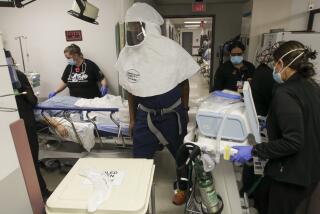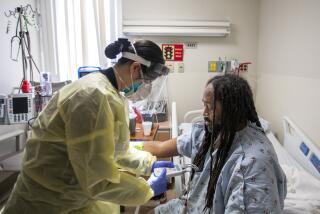Health Care Workers Discuss In-House AIDS Prevention
- Share via
COSTA MESA — As hospitals and clinics grapple with AIDS, they are finding that trying to prevent their own employees from exposure to the disease is posing a complicated challenge, experts told an AIDS conference Tuesday.
“How can we take care of ourselves?” asked Dr. Julie Gerberding, an expert on workplace exposure to acquired immune deficiency syndrome. “As health care workers, we’re used to being in control. It’s very different for those of us used to being in charge to find ourselves on the other side of the bed, so to speak.”
Gerberding is director of the Center for Hospital Epidemiology and Infection Control at San Francisco General Hospital, where, she said, up to 30% of the adult medical patients test positive for HIV, the virus that causes AIDS.
Gerberding, in addressing a crowd of about 600 health care professionals at a county-sponsored AIDS conference, said hospitals must concentrate on prevention, quick action after an employee is exposed and careful follow-up and counseling.
“Every doctor worries about (infection),” said Dr. Terence F. Maloy, president of the Orange County Medical Assn. “I’m a dermatologist, and I’ve nicked myself, but drawn no blood. I’ve been tested, and it’s been negative, but I still worry about it.”
The public attention given to Kimberly Bergalis, a Florida woman who contracted the virus through her dentist and later died of AIDS, caused some legislators to ask for mandatory testing of health care workers for HIV. But officials say health care workers are far more vulnerable to exposure through the general public than the other way around.
At Gerberding’s hospital, officials set up a 24-hour hot line for employees who think that they may have been exposed to the virus. The confidential hot line is for employees only and is staffed by hospital experts who give clinical advice and counseling.
After the hot line was set up, Gerberding said more employees started reporting incidents in which they may have been exposed to the virus.
“We don’t know if we’re making any impact,” she said of the hospital’s overall efforts. “But we’re doing the best we can.”
Gerberding said treatment for workers immediately after exposure is still an area that requires research. At San Francisco General, she said, the policy is to have the employees wash the exposed area immediately with disinfectant and to prescribe the AIDS drug AZT if the employee wants it.
Because of AZT’s side effects, which include nausea, fatigue and headaches, workers must decide for themselves whether to take the drug, Gerberding said.
More to Read
Sign up for Essential California
The most important California stories and recommendations in your inbox every morning.
You may occasionally receive promotional content from the Los Angeles Times.













